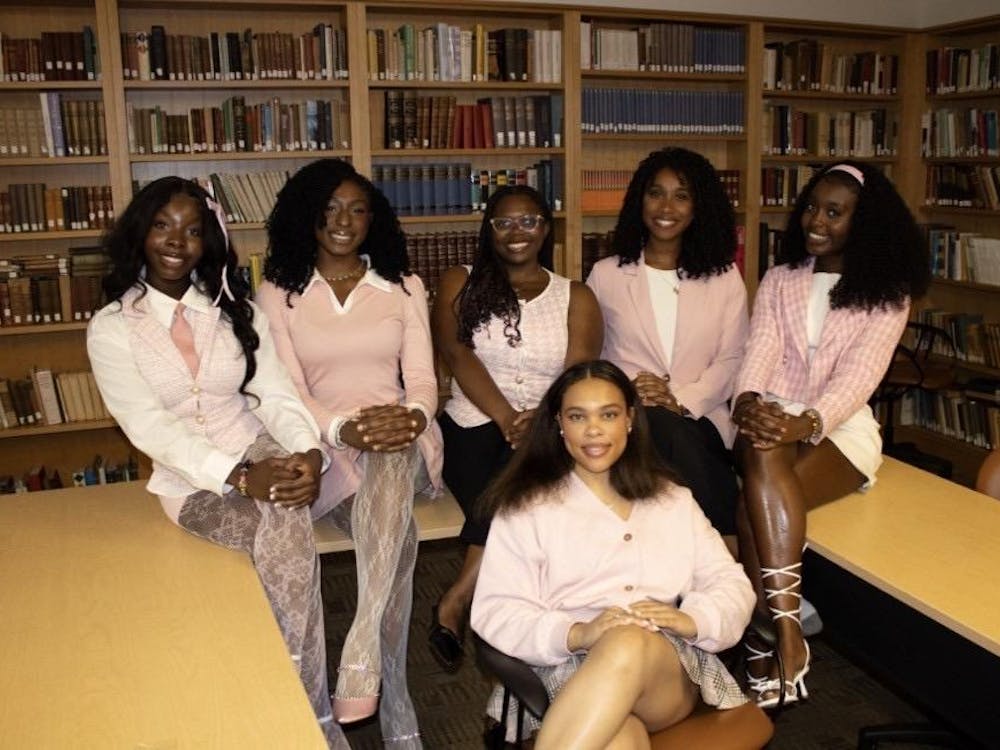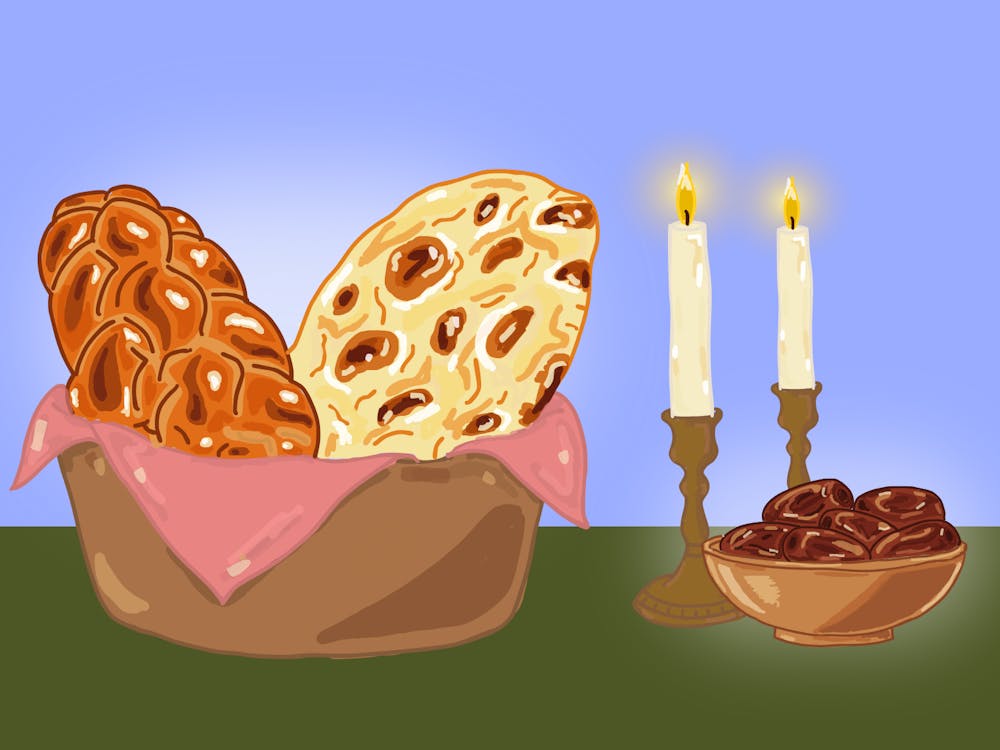10:10. A time. A place. A message.
It's Wednesday night in Jefferson Hall, and, even though it's Halloween, the religious discussiongroup 10:10, which derives its name from the time it meets each week, is ready to start.
Fourth-year Engineering studentPhil Helin tosses a few loaves of sunflower wheat bread to the gathering of about 30 students. Next is an icebreaker. The question: your favorite Halloween costume.
Then fourth-year College student Becky Kinsey, the evening's featured speaker, gives her talk on decision making. Second-year College student Bradford Walkershares a song on the same theme, playing the guitar and harmonica and singing. Within 40 minutes, everyone has dispersed - until next week.
|
"Ours is very much an attempt to be a decentralized group," said fourth-year College studentJenny Rae Cortese, a 10:10 co-founder. "We focus on the concept of coming and bringing a friend and having a conversation afterwards."
Like other organizations 10:10 carves out a wedge in the week where students can reflect on their religious beliefs. And though its meeting structure may seem unconventional compared to others, 10:10 shares a Christian commonality with many other groups on Grounds.
Out of the 30 religious Contracted Independent Organizations listed on the Student Council Server, 26 are Christian-based organizations, and numerous other non-CIOs gather each week to focus on elements of Christianity.
But there is only one main Jewish organization on Grounds: Hillel.
On a Friday evening just after 6, students pack in the foyer in the Hillel Jewish Center on University Circle and fill it with the din of chatter.
Greater Hillel Council President Jessica Newstadt stands at the front of the small space, and with Shelby Apple, Hillel's interim director, she begins to sing "Shalom Aleykhem." Soon a chorus picks up and the talking is converted to singing as the whole room joins in song.
Although Judaism includes reform, conservative and orthodox believers, in the University's Hillel chapter all three traditions gather together for the beginning of the Shabbat on Friday evenings.
After lighting the Shabbat candles together, each tradition holds its own service in a different room, but they all convene for closing prayers and a kosher dinner together afterwards.
"Throughout history the Jewish community has always been as one," said Newstadt, a third-year EducationSchoolstudent. "It kind of makes sense that we have this one Jewish organization [on Grounds]."
Apple echoes Newstadt's encouragement for all Jews to worship together.
"We've conquered so many potential problems between orthodox believers and non-orthodox believers. There's just too few of us to fight," Apple said.
But the pragmatic realty is that the University's Jewish population - which Hillel estimates at 10 percent of the student body - is smaller than the Christian population.
That difference is reflected in the number of Christian groups on Grounds. While some are affiliated with a specific denomination - Baptist, Presbyterian, Lutheran - over 15 are inter-denominational Christian organizations. With such an assortment, one could go to a differentgroup's meeting every night of the week.
Which exactly is what the founders of 10:10 wanted to avoid when they first scheduled a meeting time in the fall 2000.
"We wanted to reach a group of people that were not being reached by other organizations," Cortese said.
As the number of religious groups and CIOs proliferates, particularly Christian ones, "one question is, 'Are we just recycling the same people from different groups?'" said Greg Thompson, campus minister for Reformed University Fellowship.
In which case fellowship leaders are discussing "how to get students to stop going to every group and learn how to devote themselves to a particular group of people, a particular community," Thompson said.
"If I'm in all these different groups then I'm everywhere and nowhere," said Tripp Sanders, a staff worker for Intervarsity Christian Fellowship. "Christianity is reduced to a series of activities I do during the week, rather than a people."
Whether it's in the context of a large group meeting where 100 to 200 students gather for praise and worship, or in a small Bible study setting of eight to 10 people, building strong relationships between members is one of a fellowship's objectives.
"Our main goal is to grow in a relationship and knowledge of Christ as Lord and Savior and to develop a community that will last through four years of school," said First Year Fellowship President Katie Weber, who is a fourth-year College student.
Weber now leads a small Bible study group like the one she took part in three years ago. When she looks at the close friendships she has retained since then, she can see how much the shared faith experience of her first year impacted her life.
"It provided a community I could grow with and be challenged with and share my questions with about this thing called Christ," she said. "When people relate on that level, there's a depth of intimacy that can't be reached on any other level."
Second-year College student Ken Kostrzewa has formed those ties within Campus Crusade for Christ. Kostrzewa met Jon Iverson, the leader of Crusade's praise band, when a Christian rock band played at the Newcomb Hall plaza last year. Iverson told Kostrzewa that the band was looking for a guitarist.
Kostrzewa, who played guitar and praise music for his church in high school, had not yet found a church or religious group to join at the University. He immediately connected with the idea of joining Crusade's band.
"I just didn't have anything or anyone pushing me towards God," Kostrzewasaid. "I couldn't do it by myself. Crusade's given me a community."
Crusade and Intervarsity are part of the spectrum of inter-denominational Christian organizations that fans out through the University. And Sanders said that while some groups have their "strong points," ultimately students should choose a group based on where they are most comfortable.
"It's not because Intervarsity is the best fellowship group or we've cornered the market on how to teach scripture the best," Sanders said. "The difference is God puts students in different places and different relationships."
For some students it's not a question of joining a group, but of how to relate with those students who do.
Fourth-year college student James Duval said he does not "affiliate with any particular religion," but that other students often have the need to label people as believers or non-believers.
"I don't like just bottlenecking, pigeonholing, just putting boxes around people and things like that," Duval said. "I think that's definitely, definitely the case around here."
Sanders said that students who are involved with multiple fellowship groups, also should question whether they are confining themselves to a Christian "bubble."
"There are a lot of people at this University who aren't Christians who are just thoughtful, wonderful, amazing people to get to know," he said.
Plus, "every Christian at U.Va. is not necessarily called to be a part of a campus fellowship," Sanders added.
Fellowship leaders said that getting students to commit themselves to one fellowship is not to exclude themselves from others, but get to students to ask, "Am I really loving the people around me?" Sanders said.
"We're not trying to get people devoted to the Reformed University Fellowship," Thompson said. "We're trying to get people devoted to each other. We don't need religious consumers. We need people who love each other"






